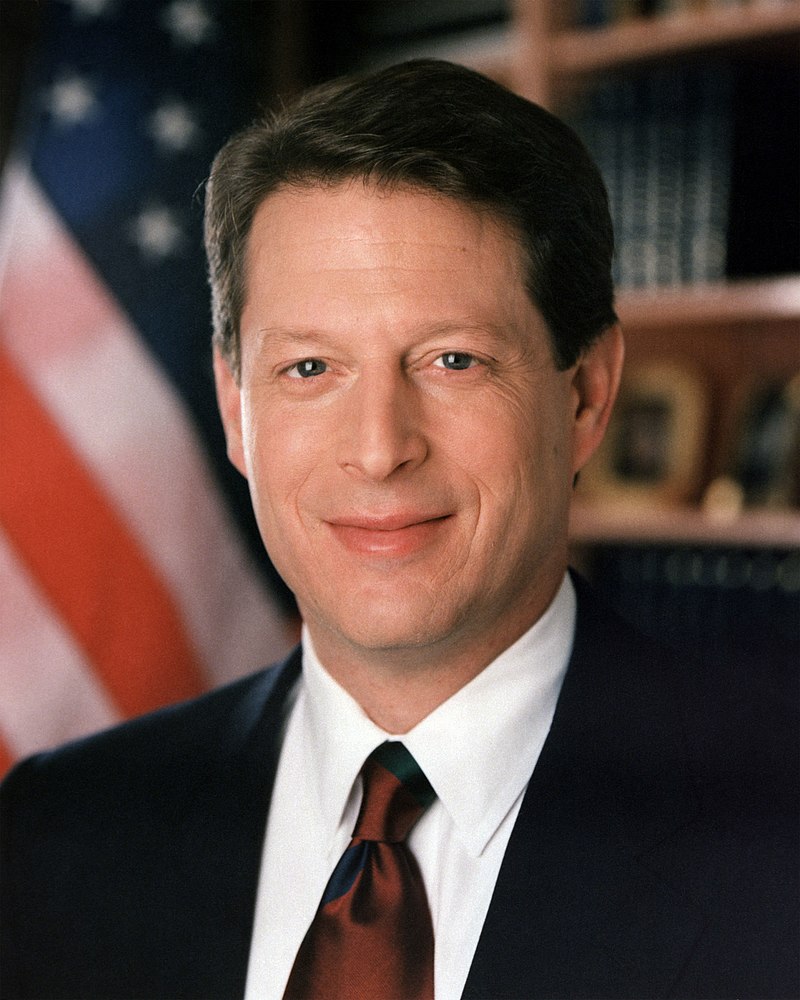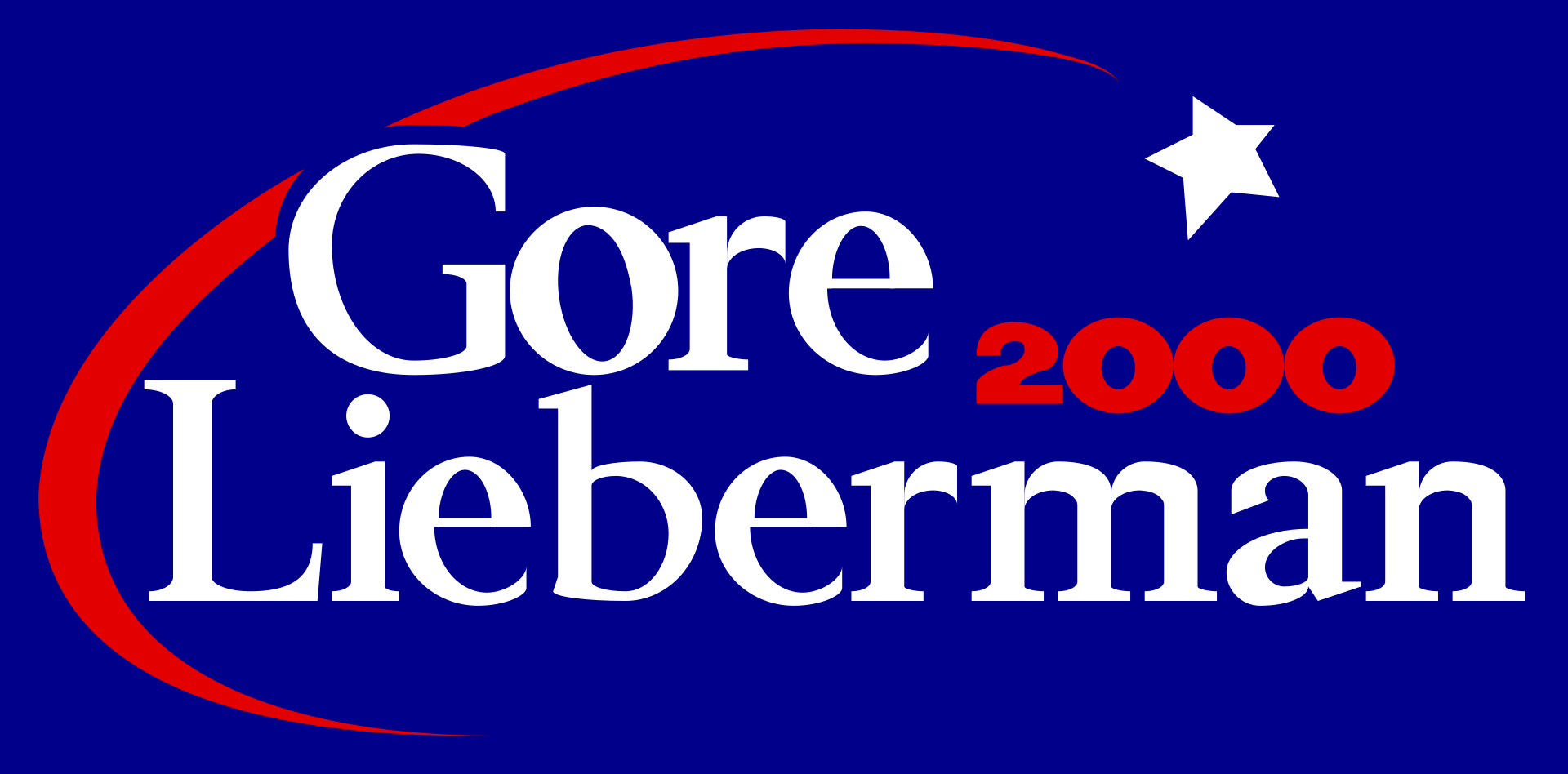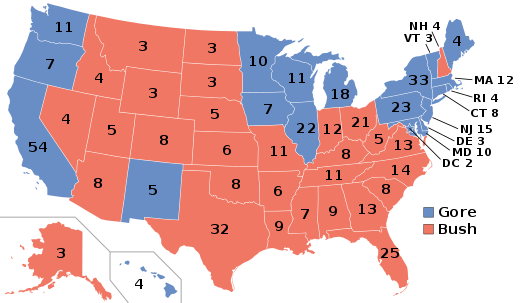2000 Election Candidates
The 2000 election was a battle between Democrat Albert Arnold "Al" Gore, the sitting Vice-President, and the Republican Governor of Texas, George W. Bush.

Democrat candidate Albert Arnold Gore. Source: Wikimedia Commons.
 Republican candidate: George W. Bush. Source: Wikimedia Commons.
Republican candidate: George W. Bush. Source: Wikimedia Commons.Democrat Candidate: Al Gore
Al Gore was a vocal environmentalist and legislator from Tennessee who hoped to secure the Presidency after eight years as the Vice-President under Bill Clinton. Ivy League-educated, he was drafted during Vietnam where he spend five months as a military journalist. He returned home to alternate between law school and journalism, which he left to run successfully for the U.S. House. Subsequent wins in the House led to a U.S. Senate seat and presidential aspirations. Gore ultimately won the Vice Presidency under Bill Clinton in 1992 and was re-elected in 1998. Al Gore chose Connecticut Senator Joe Lieberman as his running mate.

Gore / Lieberman Campaign Logo Source: Wikimedia Commons.
Republican Candidate: George W. Bush
George W. Bush, son of former President H. W. Bush, was also an Ivy-League educated politician born in Connecticut and raised mostly in Texas. Bush served in the Texas and Alabama Air National Guard as a fighter pilot at home during the Vietnam War. During the next phase of his life, he was a Texas oil businessman and part-owner of the Texas Rangers baseball team. As his popularity in Texas grew, he successfully won the state governorship in 1994 which consumed his time through 2000. George W. Bush chose former Wyoming Congressman and Secretary of Defense (under President George H. W. Bush) Dick Cheney as his running mate.

Bush / Cheney Campaign Logo. Source: Wikimedia Commons.
The Role of Third Parties in the 2000 Election
Ralph Nader was an outspoken environmental activist and attorney who ran for President multiple times. A progressive liberal, Nader ran under different third-party designations. In Florida, Nader won 97,421 votes of which the majority were likely Gore voters in a two-party matchup. Some have called Nader a "spoiler", however, he was clearly trying to create a viable alternative and was not trying to hurt Gore's chances. In total, Ralph Nader received 2,882,955 votes equally 2.74% of the vote.
Patrick Buchanan was a conservative political staffer and writer who also ran for President multiple times. In 2000, Buchanan ran as a Reform Party candidate and received the fourth largest amount of popular votes with almost 450,000.
2000 Election Results
| Candidate | Party | Electoral Votes (270 needed to win) | Popular Vote | % of Popular Vote | # of States Carried |
| ✔George W. Bush | Republican | 271 | 50,456,002 | 47.86 | 30 |
| Al Gore | Democrat | 266 | 50,999,897 | 48.38 | 20 (plus D.C.) |
| | | | | |
| Ralph Nader | Green | 0 | 2,882,955 | < 1 | 0 |
| Patrick Buchanan | Reform | 0 | 448,895 | < 1 | 0 |
| Harry Browne | Libertarian | 0 | 384,431 | < 1 | 0 |
2000 Election Results. Source: StudySmarter Original.
The Electoral College was established by the Founding Fathers in the U.S. Consitution. This process balances the popular vote and the role of Congress in voting. There are 538 electors distributed on the basis of each state's number of Representatives (out of 435) and number of Senators (2 per state). All states except Maine and Nebraska award all electoral votes to the popular vote winner in the state.
A candidate needs to win 270 votes to win the electoral vote which is cast in each state and then certified in Congress.
2000 Election Map
The election map of the year 2000.

Electoral College Results of the 2000 Election. Source: Wikimedia Commons.
2000 Election Polls
Early political opinion polling showed an initial Bush lead in the summer. A Gallup poll, conducted from June 6th to June 7th, 2000, yielded the following results:
- Republican George W. Bush led Democrat Al Gore 48% to 44% among likely voters.
- Gallup found in a 2-way Ballot (Gore, Bush) Bush would win 48% to Gores's 44%.
- Gallup found in a 4-way Ballot (Gore, Bush, Nader, Buchanan) Bush would win 46% to Gore's 41%, Nader's 6%, and Buchanan's 2%.
It was believed that a strong U.S. economy was benefitting Gore who suffered from image issues and connections to the scandal-ridden Clinton Administration. Conversely, Bush had a set of strong debate performances but was viewed overall as possessing a weaker political acumen.
In the final days of the election, the major polls showed Ralph Nader polling less than 5% with George Bush winning in most of the polls. Nevertheless, ties in certain polls and an Albert Gore win in others demonstrated the closeness of the race.
| Poll | Bush | Gore | Nader | Buchanan |
| Newsweek 11/2 | 45 | 43 | 5 | |
| Marist 11/2 | 49 | 44 | 2 | 1 |
| Fox 11/2 | 43 | 43 | 3 | 1 |
| Washington Post 11/5 | 48 | 45 | 3 | 1 |
| Pew 11/5 | 45 | 43 | 4 | |
| NBC / WSJ 11/5 | 47 | 44 | 3 | 2 |
| Harris 11/5 | 47 | 47 | 5 | |
| ABC 11/5 | 48 | 45 | 3 | 1 |
| CBS 11/6 | 44 | 45 | 5 | 1 |
| CNN / USA Today / Gallup 11/6 | 48 | 46 | 4 | 1 |
| Voter.com | 46 | 41 | 4 | |
| Reuters /MSNBC 11/6 | 48 | 48 | 5 | 1 |
2000 Election Polls Aggregated. Source: StudySmarter Original.
Exit polls were used extensively in 2000 to gauge voter sentiment and choice. Exit polls showing a Gore lead were used in early news reports and early declarations of victory. This caused some critics to argue the t.v. news media was causing many voters to abandon planned votes in the remaining hours of the day.
Florida 2000 Election
Let us talk about the election if Florida in the year 2000.
November 7th, 2000
With the eyes of the nation on Florida, scrutiny started on election night and continued for weeks amid multiple county and state-level recounts. First, national television networks prematurely called the election for Al Gore. Then they retracted that call and proclaimed George Bush the winner of Florida. Gore then called Bush to concede, despite a slim margin of victory. Then, Gore rescinded the concession and began a legal challenge that would span many weeks.
Bush: ''You mean to tell me, Mr. Vice President, you're retracting your concession?''
Gore: ''You don't have to be snippy about it… Let me explain something. Your younger brother is not the ultimate authority on this.''
A dialogue between the 2000 presidential election contestants. Source: New York Times account of phone call transcript.
At the time, the Governor of Florida was Candidate George Bush's brother, Jeb Bush. An automatic recount was required by state law due to the slim margin of victory. After this recount process, the Gore campaign called for another recount in targeted counties. In response, the Florida Supreme Court called for a recount of selected votes which was appealed by the Bush team. Because this was an immediate, national issue, the case moved to the U.S. Supreme Court.
Ballot technology emerged as an issue. The "butterfly ballot" and "hanging chad" became household names for the positioning of ballot names and the paper material that is punched out, or left partially attached. Confusing results or unintended votes for different candidates became a source of voter concern as the Gore/Bush lawsuit revealed the limits of paper ballots.
Important Dates
11/7/2000 -Election Day
11/8/2000 -Multiple recount procedures begin in Florida
12/9/2000 -U.S. Supreme Court halts all recounts
12/12/2000 -U.S. Supreme Court rules that county-specific recounts (rather than whole-state) violated the Constitution. The decision meant Bush won the 25 electoral votes from Florida- reaching the 270 mark of victory.
Bush won Florida's 25 electoral votes by a margin of 537 votes. Bush won 48.85% of the vote to Gore's 48.84%, and Nader's 1.63%.
Most people are unaware that the vote in New Mexico was closer than in Florida, with Gore winning the state's five electoral by only 366 votes!
Significance of the 2000 Election
1876, 1888, 2000, and 2016 are the four most recent examples of Presidential candidates winning the popular vote but losing the election due to the Electoral College. Like the Hayes-Tilden (1876), Harrison-Cleveland (1888), and Trump-Clinton (2016) match-ups, the 2000 election remains a debate topic on the role of the Electoral College in deciding the results of presidential races.
The election of George W. Bush did consist of the Republican winning 30 states and winning Gore's home state of Tennessee. Nonetheless, Bush could not claim a broad mandate to enact new policy. The nominal but symbolic turnout in support of third-party candidates highlighted the continuing demand for alternative positions not embraced by the two major parties.
Since 2000, candidates have learned to wait on media reports of certain 'wins' and to avoid early concessions. Americans' distrust of election fairness and assurance that their vote will be counted arose out of the Florida recount.
2000 Election - Key Takeaways
- Al Gore the Democratic candidate, was the current Vice President.
- George W. Bush, the Republican candidate, was the current Governor of Texas.
- The 2000 Presidential Election was one of the most controversial in recent electoral history.
- The winner of the popular vote (Gore) lost to the winner of the electoral vote (Bush).
- Political polls indicated a close race with Bush slightly favored to win.
- The third-party candidacies of Ralph Nader and Patrick Buchanan impacted the race.
- The vote was so close in Florida that multiple recounts were initiated.
- The U.S. Supreme Court weighed in on the recount and settled the election lawsuit.












